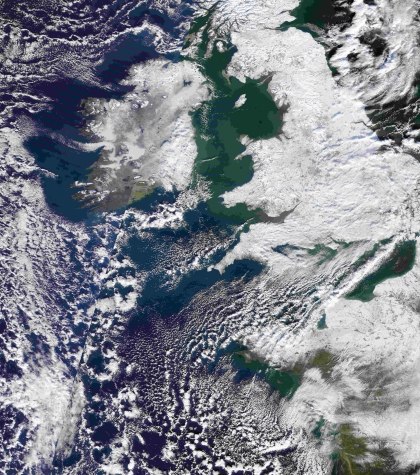
|
Press Release 04/2010
|
 |

|
Press Release 04/2010
|
 |
Press Release 04/2010 - April 15, 2010
Despite the trend towards global warming, people in Great Britain and Central Europe will possibly experience cold winters more often in the next few years. This is the result of a study by scientists from the University of Reading, the Rutherford Appleton Laboratory in Oxfordshire and the Max Planck Institute for Solar System Research in Katlenburg-Lindau. The researchers have discovered a link between low solar activity and unusually low winter temperatures in this region. It is possible that, at times of low solar activity, the mild winds from the Atlantic do not reach Europe in winter. These results do not contradict an anthropogenic climate change, which is causing the temperatures on Earth to increase on average. (Environmental Research Letters, April 15, 2010).
The sun does not always radiate with the same intensity: Phases of high activity, in which our Sun sends particularly large amounts of radiation and large numbers of particles towards Earth, alternate with comparably quiet phases in a roughly eleven-year cycle. Visible evidence of this cycle is provided by the dark sun spots which can sometimes even be seen with the naked eye. If there are a large number of these spots, the Sun is experiencing a particularly high level of magnetic activity and therefore radiates very brightly.

|
|
A view which we possibly have to become used to: large parts of Great Britain and Central Europe were covered in snow last winter as this satellite picture taken on January 7, 2010 shows. |
|
Image: NASA |
It has been known for some time that the solar cycle also affects temperatures on Earth. Particularly cold phases of Earth's history such as the so-called Maunder minimum at the end of the 17th century coincide with phases of weak solar activity. In their new study, the German and British researchers have now compared British weather records which go back to 1659 with the solar activity over the same period and evaluated them statistically.
The strength of the solar magnetic field, which extends to Earth where it causes small fluctuations in the Earth's magnetic field, served as a measure of the solar activity. Since sufficiently reliable measurements of the Sun's magnetic field are only available from around 1900 onwards, the researchers reconstructed older values using computer simulations.
"The strength of the magnetic field is a better measure of the Sun's activity than the number of sun spots, for example", says Sami K. Solanki, Director at the Max Planck Institute for Solar System Research. This is because two activity minima, when practically no sun spots dot the Sun, can be associated with very different magnetic field strengths. The Sun is much less active now than in the last 90 years.
The statistical comparison of the magnetic "temperature curve" of the Sun with the weather database shows very clearly that after decades of high solar activity and comparably mild winters, severe winters have become more common in Europe again. When the solar activity is low, the average winter temperature in Great Britain is around half a degree lower than otherwise.
The researchers' results relate only to the winters in England and Central Europe. The reason for this very regional effect of the low solar activity could be changes to the winds in the troposphere, the lowest layer of the atmosphere. The researchers assume that when the stratosphere above it heats up only weakly, the mild strong winds from the Atlantic break off in the troposphere. Great Britain and Central Europe are then exposed to the influence of cold winds from the North East instead. The exact mechanism is still unclear, however.
"The connection between solar activity and cold winters in Europe only became apparent after we subtracted the superimposed trend towards global warming", explains Solanki. Therefore the study does not contradict the theory of global warming, which is caused by human influences. On the contrary: Many things point towards the Sun being responsible for this effect to only a lesser extent.
The scientists cannot forecast whether the next winter in Great Britain and Central Europe will also be bitterly cold. Their results are of a statistical nature and only point to the trend that in times of low solar activity unusually cold winters occur more often. But even in 1685, in the middle of the Maunder minimum, the British weather records document the warmest winter for 350 years.
M. Lockwood, R.G. Harrison, T. Woollings, and S.K. Solanki:
![]() Are cold winters in Europe associated with low solar activity?
Are cold winters in Europe associated with low solar activity?
Environmental Research Letters, April 15, 2010
Dr. Birgit Krummheuer
Press and Public Relations
Max Planck Institute for Solar System Research
Tel.: +49 5556 979 462
Email: krummheuer![]() mps.mpg.de
mps.mpg.de
Prof. Dr. Sami K. Solanki
Max Planck Institute for Solar System Research
Tel: +49 5556 979 325
Email: solanki![]() mps.mpg.de
mps.mpg.de
| © 2009, Max Planck Institute for Solar System Research, Lindau |
Presseinfo 15-04-2010 |